Search Results
Showing results 121 to 140 of 169

Radar Mapping: What's in the Box?
Source Institutions
In this activity, learners mimic remote sensing. Learners use a stick to measure the distance to a "planet surface" they cannot see, and create their own map of the landscape.
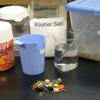
Separating a Mixture
Source Institutions
This activity was designed for blind learners, but all types of learners can explore means of physically separating a mixture using dissolving, filtration, and evaporation.
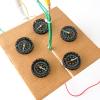
Circles of Magnetism I
Source Institutions
In this activity related to magnetism and electricity, learners create a magnetic field that's stronger than the Earth's magnetic field.
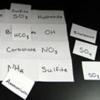
Polyatomic Ion Bingo
Source Institutions
This activity was designed for blind learners, but all types of learners can play this game to learn about the major polyatomic ions (an ion that consists of two different elements).
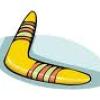
Boomerang
Source Institutions
Everybody loves boomerangs! In this activity about force and motion, the learners will experiment with boomerangs and explore how they work. This is a great activity to get learners up and moving.
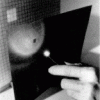
Inverse Square Law
Source Institutions
In this math activity related to light, learners explore why a light, such as a candle or a streetlight, looks dimmer the farther away from it we get.

Geyser
Source Institutions
This Exploratorium activity can be used in many contexts because geysers are great opportunities for learning about heat and temperature changes as well as geological/space science phenomena.

Powder Particulars
Source Institutions
In this introductory activity and demonstration, learners are introduced to the concept that different substances react chemically in characteristic ways.

Ladybug Spots
Source Institutions
In this art/science/math activity, young learners are introduced to the concept of symmetry in nature.

Chocolate Chip Cookie Constellations
Source Institutions
This chocolate chip cookie recipe includes templates for baking night sky constellations of the season right on top! Two templates are included, one for 9pm mid-April, and one for 10pm mid-July.
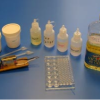
Carrying Charges: Testing for Conductivity
Source Institutions
Learners are challenged to create solutions that conduct electricity and make a buzzer buzz (or an LED light up).
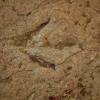
Dinosaur Footprints & Fossils
Source Institutions
In this activity, early learners simulate fossil prints in play dough or clay.
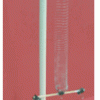
Wilberforce Pendulum
Source Institutions
In this activity, learners build a Wilberforce Pendulum, a special coupled pendulum in which energy is transferred between two modes of vibration, longitudinal ("bounce') and torsional ("twist"), on a

Fun with Shapes
Source Institutions
In this activity, early learners combine pre-cut recognizable shapes and their own abstract ideas to make representational pictures (e.g. houses, trees, shoes).

Low-Tech Water Filter for High-Impact Clean
Source Institutions
In this activity, learners consider the water features they might enjoy at a community park--a pond, brook, water playground (or "sprayground"), or pool--and what happens to the water over time.

Teen Moon: Moon Ooze
Source Institutions
In this activity, learners model how the Moon's volcanic period reshaped its earlier features.

Build a Giant Puzzle!
Source Institutions
In this activity, learners assemble large cubes to make nano-related images. Learners discover how different objects are related to nanoscience and nanotechnology.
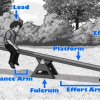
Levers at Play
Source Institutions
In this activity, learners consider how a simple machine, a lever, turns a small push or pull (a small force) into a larger--or stronger--push or pull (a larger force).

Jump to Jupiter
Source Institutions
In this activity, learners help create and then navigate an outdoor course of the traditional "planets" (including dwarf planet Pluto), which are represented by small common objects.

Moving and Working in Space
Source Institutions
In this activity, groups of four learners must complete a set of four manual tasks. The restrictions are that they must complete the tasks in a limited time while wearing garden or rubber gloves.
